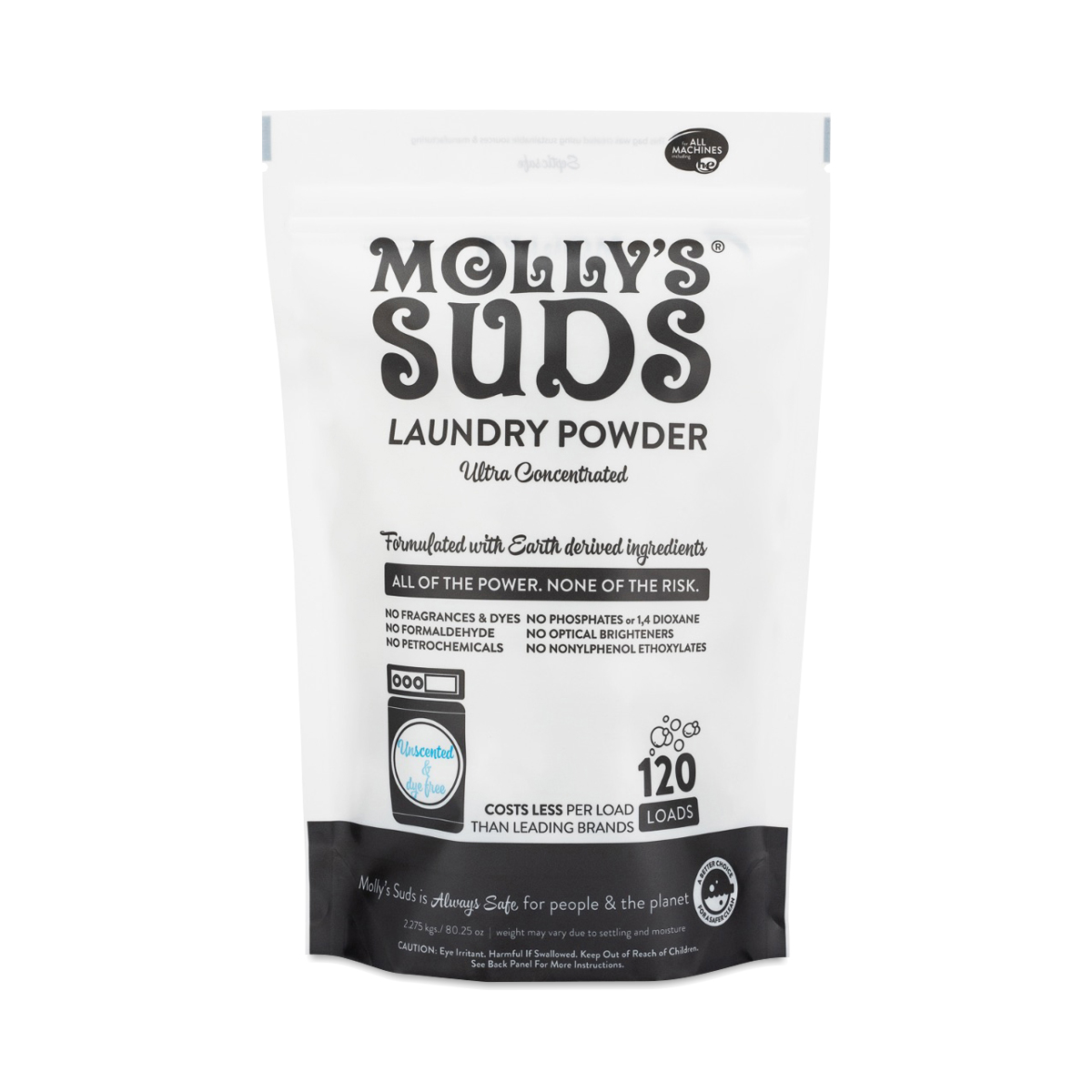Molly’s Suds Original Laundry Detergent Powder

Ingredients
Sodium Carbonate sourced from the Green River Basin in Wyoming, Sodium Bicarbonate, Magnesium Sulfate (Heptahydrate), Unrefined Sea Salt.
This natural, unscented formula is made without dyes, optical brighteners, chlorine, parabens, and other potentially harmful ingredients you don’t want in your load.
Buy on Thrive • $21.49Buy on Amazon • $22.99
Truly Free Laundry Wash

Ingredients
Clove Leaf Oil, Eucalyptus Oil, Fir Needle Oil, Lavandin Grosso, TetraSodium Salt, Lime Oil, Sodium Lauryl Sulfoacetate, Precipitated Silica, Sodium Dodecylbenzenesulfonate, Sodium Citrate, Alkyl Polyglucoside, Sodium Polyacrylate, Sodium Cocoate, Sodium Carbonate.
Experience the power of nature with Truly Free’s Eco-Friendly Natural Laundry Detergent. Their innovative Quadra Salt formula offers a safe, effective, and eco-friendly alternative to traditional laundry detergents.
Molly’s Suds Liquid Laundry Detergent

Ingredients
Water, Decyl Glucoside, Glycerin, Sodium Carbonate, Sodium Oleate, Lauryl Glucoside, Protease Mannanase, Sodium Gluconate.
Their newly-launched Liquid Laundry Detergent is a powerful, 2x concentrated formula designed to tackle your everyday laundry needs without the harsh chemicals typically found in conventional brands.
Rebel Green Organic Laundry Detergent

Ingredients
Lavender Grapefruit Fresh Laundry Water, Sapindus Mukorossi Fruit (Organic Soap Berry) Extract, Cocos Nucifera Oil & Potassium Hydroxide* (Saponified Organic Coconut Oil), Sodium Citrate, Lonicera Japonica (Organic Honeysuckle) Flower Extract, Xanthan Gum, Lavandin and Citrus Grandis Peel oil (Fragrance), Organic Acacia Senegal Oil, Organic Guar gum, Sodium Carbonate, Sodium Chloride. *No potassium hydroxide remains in finished product.
USDA Certified Organic. Natural and biodegradable. This plant based laundry detergent really cleans and is free from harmful chemicals and toxins.
Ingredients to avoid in Laundry Detergent
Nonylphenol Ethoxylate: A Threat to Marine Life and Human Health.
One of the first ingredients you should avoid in laundry detergents is nonylphenol ethoxylate. This surfactant, used to make products foamy and effective at removing dirt, poses a significant threat to marine life when it contaminates wastewater. Moreover, nonylphenol ethoxylate has been linked to reproductive system problems, making it a concern for human health as well. To protect both our environment and ourselves, it’s best to steer clear of this harmful ingredient.
Sodium Lauryl Sulfate (SLS) and Sodium Laureth Sulfate (SLES): Irritation and Environmental Harm
Sodium lauryl sulfate (SLS) and sodium laureth sulfate (SLES) are two surfactants commonly found in laundry detergents. While they enhance cleaning power, they come with their own set of issues. These chemicals can cause skin irritation and are harmful to marine life. Additionally, they may be contaminated with potentially carcinogenic impurities. To ensure the safety of your skin and the environment, it’s best to avoid laundry detergents containing SLS and SLES.
Phosphates: Skin and Eye Irritation, Water Pollution
Phosphates, often listed as a laundry detergent ingredient, can contribute to skin and eye irritation when used frequently. Moreover, they are known to contribute to water pollution. To protect your skin and the environment, it’s advisable to opt for phosphate-free laundry detergents.
Did You Know? The skin is the largest organ of the human body and acts as a shield against external factors. When in direct contact with laundry detergents, the skin can react to various chemical substances present in the detergent, leading to skin sensitivity and irritation. If you experience these issues, switching to a laundry detergent specifically formulated for sensitive skin may be beneficial.
Dyes: Potential Skin Irritation and Allergic Reactions
Ever wonder why laundry detergents are often vibrant in color? Dyes are responsible for giving detergents their hue, but they serve no true cleaning purpose. In fact, they can cause skin irritation and allergic reactions. To avoid these potential issues, opt for dye-free laundry detergents that are made from naturally sourced ingredients.
Optical Brighteners: Chemicals to Mask Imperfections
Optical brighteners are another unnecessary ingredient found in laundry detergents. They don’t actually clean your clothes; instead, they act as fluorescent whitening agents to make colors appear brighter and mask yellowing. However, many optical brighteners contain chemical substances, including the unacceptable benzene, which is associated with an elevated risk of cancer and reproductive system-related problems. To avoid these potential risks, it’s best to steer clear of laundry detergents containing optical brighteners.
1,4-Dioxane: A Possible Carcinogen
1,4-Dioxane, considered a possible carcinogen, is a common contaminant found in laundry detergents. Although it’s not intentionally added, it is often present as a residue from the manufacturing process. This contaminant is found in various blowing agents, emulsifiers, and other laundry detergent ingredients. To minimize exposure to 1,4-Dioxane, it’s important to choose laundry detergents that explicitly state they are free from this harmful contaminant.
Formaldehyde: A Carcinogen and Skin Irritant
Formaldehyde, classified as a carcinogen by the International Agency for Research on Cancer, is commonly used as a preservative and disinfectant in many everyday products, including laundry detergents. It can irritate the skin, eyes, and lungs, and prolonged exposure may lead to eczema and other health issues. To safeguard your health, it’s advisable to opt for formaldehyde-free laundry detergents.
Chlorine Bleach: Irritation and Environmental Damage
Chlorine bleach, commonly used to brighten clothes, can cause skin irritation and damage to marine life. Chlorine bleach is toxic due to the release of chlorine gas when mixed with other household cleaners, such as ammonia. Inhalation of chlorine gas can cause coughing, chest tightness, and even fluid buildup in the lungs.It’s important to avoid laundry detergents containing chlorine bleach to protect your skin and the environment.



